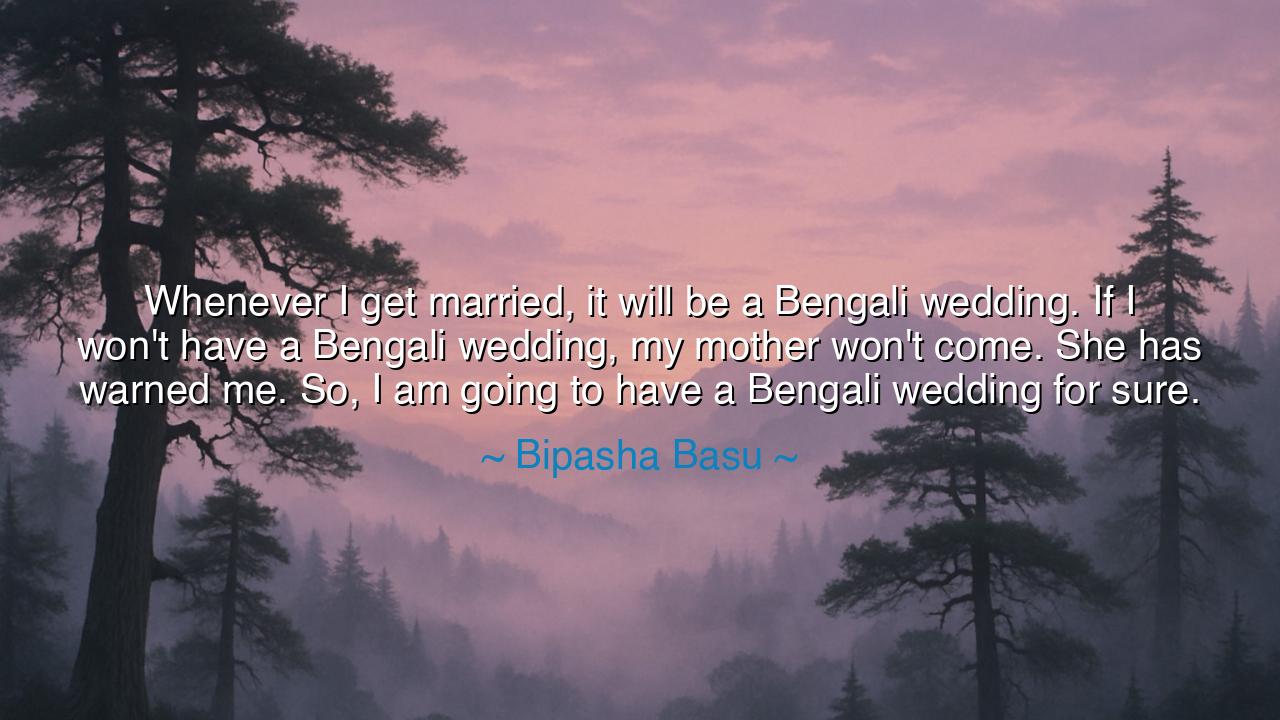
Whenever I get married, it will be a Bengali wedding. If I won't
Whenever I get married, it will be a Bengali wedding. If I won't have a Bengali wedding, my mother won't come. She has warned me. So, I am going to have a Bengali wedding for sure.






In the words of Bipasha Basu, we hear the intertwining of love, family, and tradition. She declares that whenever she marries, it will be a Bengali wedding, not merely as a personal choice, but because her mother has warned her—without such a ceremony, she would not attend. Thus, in her vow to honor her roots, she affirms a timeless truth: that a wedding is not only the union of two individuals, but also the continuation of lineage, culture, and ancestral identity.
The ancients understood that marriage was as much for the family as for the bride and groom. Among the Hindus, the rituals of marriage were sacred, not optional, for they tied not only two hearts but also generations together, uniting ancestors and descendants in a single thread. The Bengali wedding, with its conch shells, sindoor, and the bride’s hidden glances behind betel leaves, carries with it the spirit of centuries. Basu’s words remind us that in honoring such customs, one does not merely please a mother but stands as a vessel for the continuity of an entire people.
Her reflection also reveals the weight of maternal authority and love. For a mother, a wedding is not just her child’s new beginning—it is the flowering of all her prayers, her sacrifices, her dreams. To deny the mother her tradition is to wound the deepest fibers of her identity. Thus, in humor and devotion, Basu admits she must yield, for a mother’s blessing is the most sacred gift at a wedding, one that no bride would wish to be without.
History mirrors this lesson in the marriage of Akbar the Great, who, though emperor of vast lands, honored the customs of his Rajput bride’s family. By respecting her traditions, he not only secured her love but also bound her kin and culture to his own empire. In the same way, Basu’s pledge to have a Bengali wedding demonstrates the wisdom of compromise and reverence—that to embrace another’s tradition is not to diminish oneself, but to enlarge one’s story.
Therefore, let it be remembered: a wedding is more than vows—it is ritual, ancestry, and blessing carried forward. In Basu’s words, we find the teaching that love alone is not enough; it must be joined with honor for family and culture. For when a bride wears the garments of her people, stands beneath the rituals of her ancestors, and feels her mother’s approving gaze, her marriage becomes not only personal joy, but a sacred link in the eternal chain of life.






7T7_15.39. TranNguyenMinhThu
I think Bipasha Basu’s quote is funny, but it also speaks to the importance of family in the wedding process, especially when cultural expectations are involved. Do you think that people should always honor these traditions, or do you think weddings should be a time for individuals to break free from tradition and celebrate in a way that is more personal to them?
THDinh Thanh Hai
Bipasha Basu’s quote really highlights the tension between personal choice and family expectations. It’s interesting that her mother’s presence at the wedding is so tied to cultural traditions. Do you think modern weddings should always blend cultural elements with personal tastes, or is it okay for someone to completely step away from tradition to create something unique to them and their partner?
BTLe Bao Trung
Bipasha Basu’s commitment to having a Bengali wedding because of her mother’s wishes is both touching and a bit humorous. It makes me think about how important family approval is when it comes to major life events. Do you think it’s easier for some people to balance personal desires with family expectations, or is it always a bit of a tug-of-war in these situations?
TTthao thanh
I love how Bipasha Basu is so committed to having a Bengali wedding just to keep her mother happy! It’s a great example of how cultural traditions can shape such an important event. Do you think family involvement in wedding planning should be encouraged, or should couples have the freedom to design their weddings entirely based on their own preferences?
AQnguyen vo anh quan
Bipasha Basu’s situation is funny but also highlights the strength of family expectations, particularly when it comes to weddings. It makes me wonder, do you think it’s more common for people to give in to these family pressures, or do you think many would opt for a wedding that reflects their own personal desires rather than family traditions?